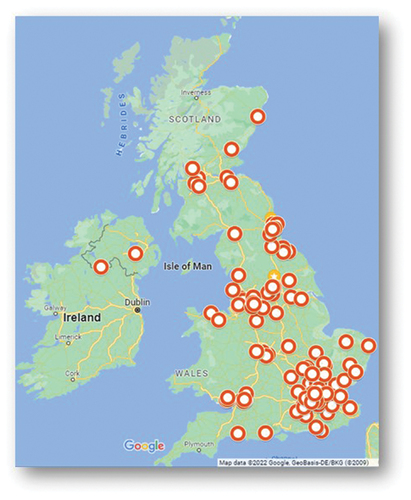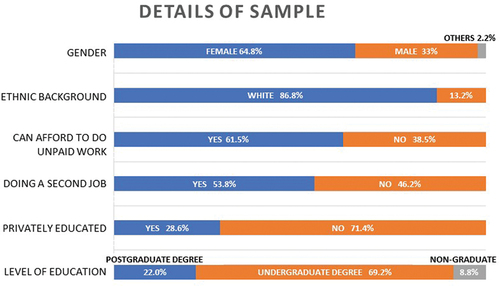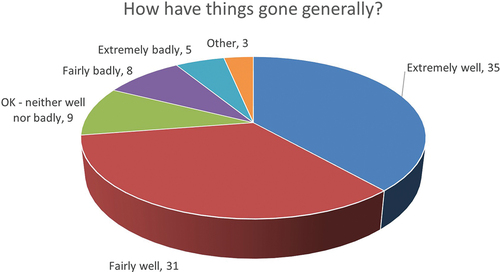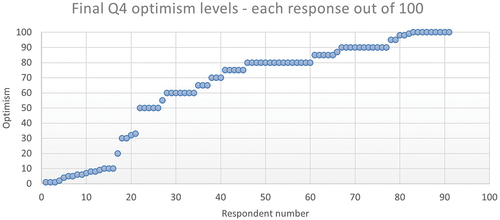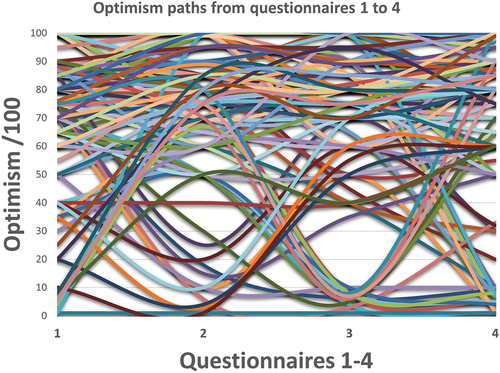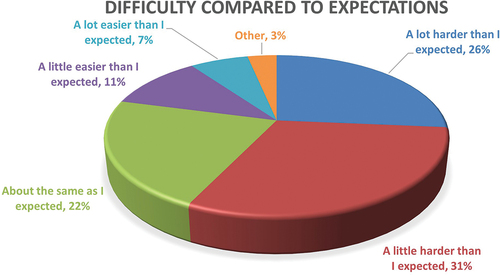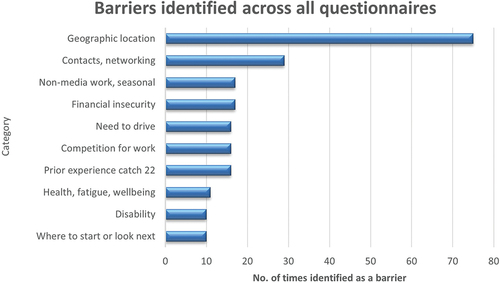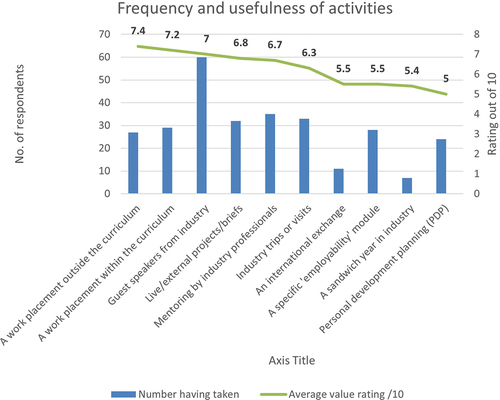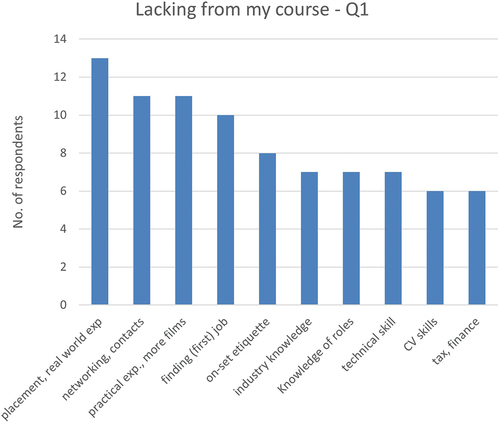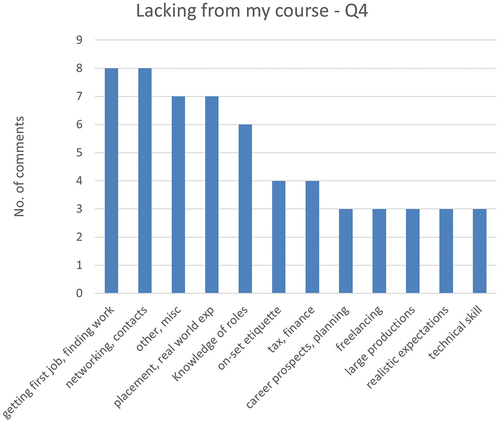ABSTRACT
This article shares the findings from a two-year longitudinal study of the employment experiences of entry-level workers in the UK film and TV industries, with particular reference to the value they attributed to their prior education – or their perception of gaps in that education. Educational institutions were better at delivering practice-based training than career skills; many graduates lacked confidence, and soft skills proved more valuable than industry-specific craft skills, in a Bourdieusian ‘hysteresis’ where cultural capital from the academic field does not align with the need for social capital in the professional environment. The study identifies and explores a high prevalence of unpaid work and barriers to progression in the media sector, including exploitation, precarity, geographic location, the need for prior experience, and challenges to wellbeing. Recommendations are offered for educators in preparing students to navigate these early years and beyond.
KEYWORDS:
Introduction
This article presents the findings of a two-year longitudinal study of the employment experiences of entry-level workers in the UK film and TV industries, with particular reference to the value they attributed to their prior education in navigating these early years – or their perception of gaps in that education. Its significance lies in providing educators with a rich new primary dataset, and in applying Bourdieusian theory to provide a novel perspective on the experiences and transitions of workers as the early years of their careers unfold.
While the area of unpaid labour has received growing theoretical attention (Brook, O’Brien, and Taylor Citation2020; Kompatsiaris Citation2015; Percival and Hesmondhalgh Citation2014; Shade and Jacobson Citation2015; Siebert and Wilson Citation2013), there has been little recent quantitative research to explore media employment experiences at entry level, or to relate them back to prior education. Crucially, as a longitudinal study the project was designed to provide not just a snapshot of working conditions, but to source longer-term narratives of progression through early career years – delivering findings which are sensitively attuned to unfolding individual experience, and relevant to policy makers, stakeholders and others (Miller Citation2015).
Indeed, previous scholars have called for just such a study. Catriona Noonan bemoaned the absence of longitudinal studies which would provide ‘a better appreciation of the education system and media landscape, along with the diversity of identities and experiences which they encompass’ (Noonan Citation2013, 151). Vicki Smith also comments that ‘Quantitative longitudinal analysis of large data sets’ is needed to trace connections between employability enhancing activities and actual career benefits from those efforts (Smith Citation2010, 295).
Literature review
The BFI carried out its ‘Television Industry Tracking Study’ more than 25 years ago (Paterson Citation2001); this longitudinal study of creative workers in television between 1994 and 1998 found fierce competitive pressure, with insufficient jobs to sustain all aspiring entrants through an entire working life – so for each individual ‘survival is their priority’ (p. 518).
Harvey & Blackwell carried out a survey of nearly 2,000 art and design graduates who graduated between 1993 and 1996 (Harvey Citation1999) and focused particularly on the benefits of work experience. This survey was built upon by the Creative Graduates Creative Futures project (Ball, Pollard, and Stanley Citation2010). A large cohort of approximately 27,000 graduates in art, design, craft and media had completed practice-based programmes of study from 2002 to 2004; they were found to benefit in particular from PPD (Personal and Professional Development), live briefs, self-organised placements, and staff or student networks. Other surveys (Daniel and Daniel Citation2015; Haukka Citation2011) have found that solutions for educators included providing industry experience as early as possible, and developing industry collaborations.
The role of HE has also been explored in relation to the preparation of cultural workers. Ashton & Noonan set out to move beyond a discussion of graduates as industry-ready talent for employers (Ashton and Noonan Citation2013), exploring instead ‘how HE may provide openings for understanding cultural work and presenting different ways of working, different identity dispositions and different social concerns’ (p. 17). They contest that issues of access and equality can not only be addressed, but also partially resolved within an HE environment by a critical understanding of some of the uncomfortable realities of work in the industry. Far from widening and equalising access to the creative industries, however, others suggest that HE may actually play a part in perpetuating social and cultural inequality (Oakley and O’Brien Citation2016); or may lead graduates to feel that their degree entitles them to hurdle established entry-level runner positions (Ashton Citation2015).
It is sadly impossible to analyse entry-level experiences without reflecting on the spectre of free labour. Unpaid ‘first job’ work is considered by writers such as Blair (Citation2001) who discusses the social and ethnic network barriers to ‘getting in’, by Banks (Citation2007), Antcliff et al (Citation2007), Lee (Citation2011) and by Saundry et al (Citation2012), who all reflect on the role of (potentially exclusionary) networks in this process. Significantly, a qualitative study of perspectives of stakeholders in unpaid work in the creative industries (Siebert and Wilson Citation2013) felt that social capital was insufficient to justify the practice – also pointing out that ‘there is a dearth of studies on the experience of acquiring social capital through unpaid work’ (p. 713).
Bourdieu’s sociological framework of field, habitus, and capital offers a valuable lens through which to explore the operations of this sector, and the findings of this project – especially through overlaying concepts of symbolic violence and hysteresis (Bourdieu Citation1977, Citation1986, Citation1989, Citation1990, Citation1991). This is not the first study to take a Bourdieusian approach to the screen sector; Randle et al drew effectively on the findings of 99 interviews to conclude that to succeed in gaining entry, individuals have to develop personal strategies to acquire, extend, and swap forms of capital (Randle, Forson, and Calveley Citation2014). They conclude that the ‘further application of a Bourdieusian framework to life chances in the creative industries could prove fruitful’ (p. 14).
For this study, Bourdieu’s theories are applied to the process of moving from education to profession, not as a natural continuum or progression, but instead as a dislocating transition or ‘hysteresis’ between two contrasting ‘fields’. Just as relevant here is Bourdieu’s approach to artistic and cultural production (Bourdieu and Johnson Citation1993). Newcomers into the artistic field, he argues, have the greatest interest in a denial of economic motivation, because this claim is the only way in which they can legitimise their own sense of the value of the art in itself (Grenfell and Hardy Citation2007). This acceptance Bourdieu sees as a form of symbolic violence, manifested in the media industries as a predisposition to work for free; a vulnerability to which educators may unwittingly contribute.
Methodology
The principal source of primary data in this project was a two-year-long survey of entry-level workers in the film and TV industries, carried out as part of the author’s doctoral thesis (Percival Citation2021). Eligibility at the point of sign-up was restricted to individuals who were still seeking their first professional work in the film and TV industry, or within one year of carrying out their first day of professional work (whether paid or unpaid). Recruitment was carried out using networks such as the trade union BECTU (which has a ‘Student Register’), several popular job advertising and CV hosting websites, the Edinburgh TV Festival’s new entrants scheme, Facebook groups for entry-level workers, regional screen agencies, and other online networks and communities.
Participants signed up for the survey using an online registration mechanism, and were then sent an initial questionnaire which profiled their backgrounds, aspirations, and education. They completed three more questionnaires at 8-month intervals, providing data about any contracts completed and the nature of these contracts in terms of employment conditions. They were asked a number of other more qualitative questions including their optimism about the future, and the preparation they felt they had received or lacked from their previous education. Questionnaires were managed through the ‘JISC’ online survey mechanism, and analysed using a combination of Excel for numerical data, and N-Vivo to cross-refer recurring themes in qualitative responses.
151 respondents filled out the first questionnaire; an element of natural attrition meant that 91 completed the full longitudinal series of all four questionnaires, with a further 17 completing an exit survey along the way. Starting in staggered groups, questionnaires were completed between October 2017 and October 2020.Footnote1
For the sake of analysis, all the written narratives were examined across all four questionnaires, and each individual was then given a comparative ranking between 1 and 10, based on the progress they had made in their careers against their initial goals – enabling a consistency of baseline comparison. In the rest of this text, as above, Q1 refers to the first questionnaire, through to Q4, the final one.
Findings
In terms of academic qualifications, a total of 83 respondents (91% of the sample of 91) were educated to degree level, including 20 to postgraduate Masters or equivalent. The sample represented a broad geographic spread of postcodes across the UK, as shown below in :
26 respondents (28.6%) had attended a private, independent or fee-paying school at some point during their education – double the national average (Independent Schools Council Citation2018) – which is also consistent with the screen industry workforce (Carey et al. Citation2020; Friedman and Laurison Citation2019). The occupations of respondents’ parents were weighted heavily towards the top end of the ONS socio-economic spectrum, particularly in the class 2 classification of professional and managerial occupations – but again, very consistent with the wider, disproportionately privileged AV workforce, indicating this degree of privilege exists even before they encounter the barriers of entry level work (Banks and Oakley Citation2016; Bathmaker, Ingram, and Waller Citation2013). More than half had another job; 56 said they could afford to do some form of unpaid work, while the other 35 said they could not. 88% (79 respondents) identified as white, and the sample was skewed 2:1 towards women (partly because more women than men stayed with the project to the end); although it does tie in with findings elsewhere suggesting that at entry level, there is a higher proportion of female workers in the sector (Creative Skillset Citation2014; Sargent-Disc Citation2011). See for details.
In general terms, the majority of participants reflected positively on the two years covered by the project. In the final questionnaire (Q4) they were asked: ‘How do you think that things have gone generally, in terms of your career progress since you first started looking for work?’
35 out of 91 (38.5%) said ‘extremely well’, while another 31 (34.1%) said ‘fairly well’; these 66 answers together equated to 73% of the respondents ().
Another question in each questionnaire related to career confidence levels: ‘How optimistic do you feel about being able to make a successful career in the film or TV industry?’ The average response at the final questionnaire was just over 64 out of 100, although respondents used the full scale from 1 to 100 ():
Progress over time, however, tells a slightly different story. Individual paths swing greatly, as this composite image shows – which includes a single path for each respondent ():
There are patterns discernible here, but for many participants, this was a rollercoaster ride; the average gap between lowest and highest optimism point over the four questionnaires was just under 40 points out of 100. This is echoed by the fact that while achievement was evidently high, compared to their initial expectations, 57% found the process a little (31%) or a lot (26%) harder than expected ():
In terms of correlations with diversity characteristics: by the end of the longitudinal study, women were slightly more confident of career success than men; those who declared a disability, while starting off less confident, had greater career success than the overall cohort; those with private education were also slightly more confident while those who self-identified as working class were slightly less so. Non-white participants however, and those aged over 30, were at least 20% lower than the cohort average in terms of optimism by the end.
Unpaid work
The original research project had several stated goals relating to the frequency of exploitative or definably illegal employment conditions encountered. Unpaid work turned out to be highly prevalent; moreover, a significant proportion of it was definably illegal. Just over 80% of the cohort (71 respondents) carried out some form of unpaid work during the course of the project, and 28 of those 71 (just under 40%) felt that the work they had done met criteria to be considered illegal under UK national minimum wage laws.
A total of around 2,850 days (11% of the total) were unpaid during the project. If we assume an eight-hour day at a National Living Wage of £9.50/hour (UK Government Citation2021), then this total of 2,850 unpaid days translates into a wage saving for employers of just under £217,000 – around £2,400/head if shared equally between the 91 participants.
This was heavily weighted towards the very earliest stages of careers, however; out of the 151 who completed the first questionnaire (as opposed to the 91 who completed all four), 78% had already done some form of unpaid work; out of the estimated 8,560 days of work completed by respondents before taking the first questionnaire, just under a third of total worked days (32%) were unpaid. Between the first and second questionnaire, roughly eight months into the project, it had already fallen to 7% of the days worked, and between Q3 and the final Q4, it was less than 3%.
Participants started off with mixed views towards unpaid work, but there was a steady, if partial swing in opinion, as paid work took over – from seeing its benefits, towards seeing it with hindsight as exploitative. Unexpectedly, however, there was no apparent correlation between the amount of unpaid work, and more successful career progression or paid work – suggesting that unpaid work is by no means a pre-requisite to career entry or career success, as often assumed.
Barriers to career launch
Analysis of qualitative comments around barriers to entry brought some distinct themes (). Unexpectedly, geographic location outnumbered all other factors (identified as a barrier by 31 respondents in the final questionnaire). Many faced a difficult dilemma within the timescale of the project, deciding the right moment to move closer to work usually at the cost of much higher rent; 75 comments over the four questionnaires related to challenges of changing location. Lack of contacts was a key challenge (29 comments), as was the problem of seasonal work and needing to rely on a second job (17); also featuring heavily was the ‘catch 22’ of needing work experience on one’s CV, in order to get work experience – a factor that commonly drove respondents towards unpaid work to build their first CV credits (16 mentions). This challenge also connects to a secondary theme of the insecurity of financial precarity as a freelancer (17 comments in this theme) – with consequent mental health and wellbeing issues for some (11 identified this as a barrier). Over time, there was a change in the barriers to progression encountered. When looking back on the full two years at Q4, location continued to dominate, and contacts remained a constant challenge throughout the project; financial insecurity grew in frequency as a barrier.
Educational findings
Turning now to the participants’ education: at the most general level, having a degree correlated to a much higher proportion of successful progression. Those without a degree (although this was a small number, eight, in this study) were around a third less optimistic about their future careers at Q4. At the other end of the scale, a postgraduate degree brought limited benefits to the 20 who qualified to this level. At the start of the study, they gave their education an average of only 3.5 out of 10 in terms of how well it had prepared them for their career choice (as opposed to an average 5.2 for all graduates) and their optimism levels averaged almost 10% lower.
In terms of employability-focused elements encountered within their programmes, respondents were given a list of common activities and asked to rank them in terms of ‘how valuable you felt these elements were in preparing you for your career choice’ (out of 10). The highest average value went to ‘a work placement outside the curriculum’ followed closely by ‘a work placement within the curriculum’ – contains a fuller breakdown, in descending order of average perceived value (the right-hand column):
Table 1. Perceived value of programme activities.
represents this data visually – the green line indicating the average perceived level of usefulness, and the blue bars indicating the number of participants who encountered each activity.
Respondents were also asked at Q4: ‘How well do you feel your previous education has helped you overall (since you started looking for work) in establishing your chosen career – on a scale from 1 (not at all) to 10 (extremely well)?’ Those who answered this question the most positively (answers of 7 or above) had a slightly higher proportion of directly or indirectly relevant degrees, and a significantly higher proportion (14% above average) of graduates who had received mentoring from industry professionals as part of their programme.
At Q1, respondents were asked about the ways that their programme had (or had not) prepared them for employment. The two questions were worded as follows:
In what ways did your course generally prepare you for employment in your chosen career? What are the most valuable skills/attributes/knowledge you acquired?
What do you feel your degree course lacked, that would have prepared you better for access to your chosen career?
Unsurprisingly, there was a lot of common ground in the two sets of answers – many of the same elements which were appreciated by some, were felt to be absent for others. The key observation here is that generally speaking, programmes appear to be delivering practice-based craft skills more effectively than industry experience, understanding and knowledge. The top seven themes which respondents felt to be lacking from their degrees at Q1 related to various forms of industry experience, knowledge, and employability skills – suggesting that these elements were less present than practical craft skills (see ). 13 respondents commented on the most frequently-appearing theme – a lack of work experience or placements:
More contact with industry people, more job recommendations. Definitely lacked the chance of a work experience or internship - should be compulsory on these courses!
More real-world placement opportunities and places to apply and develop practical knowledge outside of a classroom environment.
The next most common (and closely related) theme was a lack of networking and contact generation (11 comments).
By Q4, answers to the same questions were strikingly different to Q1 (see ). Support and knowledge in how to find and get the first job were felt to be lacking by more respondents, by the end of the study; this had become the top theme, and also connected to a high number of comments about networking and contacts:
More help on how to become a TV researcher, and the progress into production.
Film schools and schools in general should be teaching about finding work, employment rights, minimum wages, tax etc.
Assistance in how to apply, where to apply, and how to go about networking and getting the food into the door.
At Q1, the third highest theme in terms of frequency, featured in 11 comments, related to a desire to have made more films, or gained more practical skills: ‘I wish we were able to make more films to build up a better portfolio of work’. However, by Q4 there were no comments wishing they had made more practical work. Graduates evidently felt initially that their graduate portfolios and practical skills would be important to them, but found over the first two years that this was not, in fact, the case – just as they also felt a greater need for work-finding and contact-building skills.
These responses tied in closely with another set of questions in the first questionnaire where respondents were asked what industry-specific or generic soft skills they possessed which would help them access their chosen career – and which skills or attributes they felt they lacked. When discussing industry-specific skills they already had, participants primarily listed variations of technical skills (48 references) such as camera, editing, or writing – more commonly cited as present than as missing. When exploring the soft skills which participants felt they already possessed, three themes stood out. The top was ‘positive attitude’, in various guises, with 51 references. Just behind that was ‘teamwork’ with 48 comments, and ‘communication’ with 43.
When exploring the soft skills which participants felt they lacked at Q1, the story was very different. The single attribute which dominated very strongly – more than three times the number of comments of the second most prevalent theme – was ‘confidence’ (28 comments); something that was not mentioned at any point in the list of soft skills possessed. The next most prevalent themes – all in single figures – were communication, organisation, interpersonal skills, networking/contact development, assertiveness (not unconnected to confidence), and the ability to take rejection. The themes of confidence and communication were often linked:
… communication, I can be quiet and softly spoken and I think you need to be able to be quite outgoing in some aspects in the industry.
Bit more confidence when first meeting new people, need to develop a thicker skin
I need to be more outgoing/people person and not be afraid to put myself out there
One other striking finding from Q1 is worth reporting. After sharing the hard and soft skills they possessed or lacked, respondents were next asked: ‘What else do you think you will need, to gain access to the industry?’ One topic dominated the responses: variously expressed as ‘Contacts!’, ‘Know the right people. A good network of industry workers and friends’, ‘Networking within the industry’, and ‘Someone on the inside’. Overall, a total of 56 comments referred to contacts and/or networking in this way. The next theme had less than a quarter of the comments (13), which was ‘experience’ (then in descending order, ‘money’, ‘luck’, ‘opportunities’, ‘personality’, and a car/driving licence).
Connecting to this is another finding from the study which brings the need for soft skills into sharp relief. The factor with the greatest correlation to progression success was not a demographic or educational factor, but one relating to methods of finding work. When respondents took Q2, eight months into the project, they were asked how they had managed to find their current or most recent piece of work. A substantially higher proportion of those who ranked 9 or 10 out of 10 (in other words the top 20%) on my comparative ranking of their success, and of those who claimed the highest optimism at Q4, had in the first period of the project either directly approached an employer, been approached directly by an employer, or found the work through someone they worked with before; in other words, the work came about through a direct personal contact, as opposed to social media, a job advertisement, or other platform.
At Q3, looking back on the second period of work, the same group were much more likely to have been approached by an employer, than to have approached one – indicating that repeat business was starting to kick in; indicating that those who had begun their job search through direct contact methods had become more quickly established than any other group. By contrast, those with the lowest success outcomes at Q4 also had the lowest use of direct contact methods. This showed a greater correlation than any other factor relating to personal success throughout the project: social capital appears to outweigh other assets at this stage.
Discussion
Returning to the literature on which this study builds, we recognise the oversupply of the labour force (Saundry, Stuart, and Antcliff Citation2007), the vulnerability and disposability of entry level workers (Mark Banks Citation2017), and the ambivalence encapsulated by Hesmondhalgh & Baker’s ‘complicated version of freedom’ (Hesmondhalgh and Baker Citation2011; Rowlands and Handy Citation2012). To consider the barriers, insecurities and challenges faced by new entrants is, however, not to overlook the successes and pleasures experienced by those who progressed into rewarding ‘good work’ (Bridges Citation2018; Eikhof and York Citation2016); this is not an entirely negative critique of the sector, given the level of positive overall career progress reported by a majority of the participants.
At the same time, even within individual narratives, the pleasure and engagement experienced from one contract invariably co-exists with the sacrifices and personal investment made to secure it, together with a lack of certainty as to where the next project will come from (Morgan and Nelligan Citation2018; Peuter Citation2014; Shukaitis and Figiel Citation2020). Most strongly we see the emphasis on ‘self’, the focus on individual career progression without reference to any wider form of collective, with a consequent danger of linking work to self-identity, and career challenges leading to individual self-blame (Lee Citation2012; McGuigan Citation2010; McRobbie Citation2002).
Three particular studies offer a launchpad into discussion of the data from this research. Ashton reflects on the usefulness of a ‘Career Studies’ approach within universities as a framework to consider the notion of employability (2011) – ‘a space in the curriculum for students to consider the ideas and beliefs of self and others concerning career, labour markets and employability’ with time and permission to be critical of industry practices. Secondly Vicki Smith echoes Ursell (Citation2000, 816) in acknowledging that at the heart of the new economy, the desire for workers to re-create themselves reflects a personal adaptation and buy-in to what is in fact a requirement, not a choice, such that ‘we fail to challenge the structurally created inequalities of the 21st century’ (Smith Citation2010, 295). Finally the work of Randle et al is key in recognising the value of a Bourdieusian framework to explore a self-reinforcing system which requires new entrants to develop strategies to acquire, extend and exchange forms of capital (Randle, Forson, and Calveley Citation2014).
This study advances understanding in several ways. To begin with, its longitudinal approach offers specific and extensive new knowledge about entry level worker experiences, and the benefits and deficits of current educational approaches in supporting navigation of these early career years. There is evidence here for example that graduates quickly switched from valuing practical skills and production portfolios, to a stronger appreciation of softer work-finding, communication, confidence-building and contact development skills; they felt especial benefit from work placements, guest speakers, and live briefs – with a suggestion that mentoring by professionals particularly increased positive outcomes.
New from this study is quantifiable data about the prevalence of unpaid work, with a significant proportion of it definably illegal; but also the knowledge that as this unpaid work rapidly drops off in favour of paid, workers quickly learn to look back on it as exploitative. There is much new data here for educators to inform the kind of critical discussion within the career studies curriculum space advocated by Ashton: scope to prepare graduates to consider the need to rely initially on non-media work, to consider the significance of their geographic location, to develop capacity to look after their mental health, and to expect a rollercoaster of ups and downs in confidence levels as they progress into their careers. Indeed, at a fundamental level, simply finding ways to build confidence in talking to strangers would seem to fill one of the most consistently felt deficits in entry-level skillsets. The pay-off in terms of using direct contact methods appears equally clear, with strong correlations to more successful outcomes.
With Smith’s sense of workers buying into the self-reinforcing structural inequalities of the sector, we can synthesise both the knowledge from this study of a growing awareness of exploitation from graduates as time passes, and the understanding from Bourdieu of the predisposition of new entrants in a creative sector to conceal their lack of economic capital within a predisposition to self-exploit and undervalue their labour in the name of ‘art for art’s sake’. We can also see in play the Bourdieuisan exchange of forms of capital described by Randle et al, as new workers build and invest in social capital to make headway; and an extension of this understanding is proposed, by identifying a process of hysteresis which new entrants need to be prepared for, in transitioning from an educational to a professional field. It is also, in addition, fitting to see the prevalence of unpaid work as a manifestation of the symbolic violence which Bourdieu named as a way of calling out the perpetrators of structural inequality – and responding accordingly.
Bourdieu, the field, and forms of capital
At the simplest level, the ‘field’ for Bourdieu is any sector, social space, or area in which individuals interact and implement strategies to improve their positions, based on increasing and exchanging different forms of ‘capital’ – whether economic, or more symbolic forms such as cultural and social capital. Each individual has a ‘habitus’ which guides their decisions and strategy in the field – a set of predispositions, attitudes and tendencies, based on previous interactions with the field, sometimes characterised as a ‘feel for the rules of the game’ (Bourdieu Citation1977, Citation1986, Citation1989, Citation1990, Citation1991).
Different forms of capital – such as economic, social and cultural – determine individual ability to adopt more advantageous positions within the field (in this case, the film and TV labour market). Economic capital is replenished through remuneration for paid work – but also drained via the necessity of doing unpaid work. Cultural capital exists (amongst other forms) in the possession of a graduate’s portfolio of work, in the form of professional production credits, and in a critical knowledge of culturally shared touchpoints.
Crucially, for this study, we need to recognise a second field – the educational field – as operating separately to the professional field. Our respondents were in transition from the educational field to the professional, and it is the significant set of differences between these two fields – and the challenge of moving from one field to another – that is vital in locating the findings of this project.
For Bourdieu, all forms of capital are ultimately transubstantiated forms of economic capital – and always employed for economic gain; whether consciously or, frequently, unconsciously (Bourdieu Citation1984; Bourdieu and Johnson Citation1993). Newcomers into the artistic field, he argues, have the greatest interest in a denial of economic interest, because this claim is the only way in which they can legitimise their own sense of the value of the art in itself (Grenfell and Hardy Citation2007). For Bourdieu, this misrecognition is a form of ‘symbolic violence’, since it enables players in the field to imbue themselves with more power in their position through an entirely arbitrary imposition of values of one form of cultural taste over another. The graduate and newcomer buys into this value – this definition of cultural capital – and the value of ‘art for art’s sake’ as being greater than an economic return. But an educational habitus that builds strategies primarily around creativity, in its implied rejection of commerciality and ‘disinterest’ in economic value, has two risks. It firstly creates a habitus pre-disposed to prioritise different forms of capital to those which are actually advantageous in the field, as our findings show; but more significantly, if this habitus is developed in an educational setting, it can pre-condition graduates to exploitation when they move from an academic to a professional field.
We can see connections with the phenomenon of ‘self-exploitation’ amongst creative workers (Ekinsmyth Citation2002; Hesmondhalgh and Baker Citation2011). Bourdieu observes that those who are oppressed by symbolic violence are, generally speaking, consenting and ‘invested’ or ‘interested’ actors in the hierarchies which oppress them (Bourdieu and Wacquant Citation1992). This has already been identified within the literature around the creative industries (Shukaitis and Figiel Citation2020; Smith Citation2010), but most strikingly in relation to the TV sector by Ursell, who identified how exploited workers consent to co-operate with the ‘vampire’, unconsciously arranging their own methods of finding and conducting work to fit its demands: ‘victims of capitalism… obliged to work against their own best interests, or “ideological dupes”, that is, not even aware that they are working against their own best interests’ (Bourdieu Citation2000, 816).
Hysteresis
For the purpose of this discussion, another concept of Bourdieu’s has even more resonance. He considered that individuals progress and operate most successfully when their habitus is closely attuned to the field in which they operate. But in certain conditions, habitus and field fall out of sync, and individuals lose their sure sense of footing in the game – if for example the field is suddenly altered, by an external social or economic force.
This state of misalignment with the field was characterised by Bourdieu as ‘hysteresis’ (Bourdieu Citation2000) – derived from an ancient Greek term meaning ‘deficiency’ or ‘lagging behind’. Significantly for this project, hysteresis can occur not just when a field changes, but when individuals move from one field to another; and this process of hysteresis is evidently at play, to varying degrees, when individuals move from an educational to a professional field, as our findings show.
The forms of capital which they have acquired during education will help to determine whether they can successfully move from one field to another. The habitus which they have formed, in terms of values, predispositions and strategies, may also need to adapt rapidly. Some degree of hysteresis will be inevitable, and it is how they negotiate this hysteresis which will have the most significant impact on their immediate outcomes. If educators wish to effect a successful transition between fields, it is their responsibility, at least in part, to identify and nurture the appropriate forms of capital, and effective characteristics of habitus, to be able to minimise the upheaval of this hysteresis.
If we assume that a student’s position in the academic field is determined by marks and module assessment outcomes, therefore, students may be led to value the quality of their work and the demonstration of their craft and creative skills most highly. Assuming a practice-based environment, the films or media artefacts they make are a form of objectified cultural capital; the creative and craft skill they develop is a form of embodied capital which shapes their habitus and strategies in specific creative contexts (Bourdieu Citation1984). This habitus is constructed, however unconsciously, to allocate power to specific forms of cultural capital.
Within the labour market, however, the allocation of power is different; and as we see from the findings for this study, social capital immediately becomes much more valuable. So if graduates have a habitus attuned to producing and appreciating cultural work, they may be less well adapted to developing the social capital or habitus required for finding jobs or contracts for commercially funded work, getting their independent work commissioned, or setting up their own enterprises. At Q4 in particular, respondents indicated that their education could have given them a better training in finding and securing work; the project also indicated that contacts and social networks are the routes to such success, so that graduates who emerge with little social capital, or a habitus not predisposed to extend that capital, will suffer the greatest form of hysteresis.
Conclusions
To minimise this hysteresis, therefore, academic curricula need a balance of time spent on practice-based work, alongside a significant investment in building confidence, extending networks, developing contacts and contact-building skills, and studying the industry’s operations. Bourdieu’s model of social, cultural and economic capital is itself a valuable tool to use when considering this transition with students in the classroom.
When 80% of the respondents say they have carried out unpaid work at some stage, and more than two thirds of the unpaid days in the first 8 months of the project were felt by respondents to be definably illegal, there is also still a clear and urgent need for educators to provide a space in the curriculum to consider not only a strategy for navigating unpaid work, but also to form an ethical and critical response to it. This is not an easy sell, given the ‘mixture of mystification and defensiveness’ which usually greets attempts to explain that unpaid work undermines the rest of the workforce (Oakley Citation2013, 40). But if educators describe unpaid work as ‘inevitable’ - which this study suggests it need not be – we perpetuate the ‘symbolic violence’ that unpaid work represents; it should not be presented as part of the ‘doxa’ – the normatised unwritten rules of the game – when it reduces the supply of paid jobs, and has wider implications in terms of the longevity of their own careers (Paterson Citation2001; Siebert and Wilson Citation2013). Indeed, while this article focuses on entry-level barriers, educators should not overlook the longer-term problems of career sustainability – since the talent pipeline also leaks established professionals through career exit at a significant rate (Percival Citation2020; Wallis and van Raalte Citation2022).
Sharing and discussing former examples of successful resistance against exploitative conditions would also help to demonstrate to graduates their own potential agency in bringing about change, and the efficacy of working collectively and collaboratively, rather than promoting the personal self-blame which is evident throughout these narratives. Looking at examples such as the TV Wrap campaign (Percival and Hesmondhalgh Citation2014), the Picturehouse Cinemas action (Percival and Lee Citation2020), English National Opera and ‘Dancing in the Streets’ (Simms and Dean Citation2015), or Cultural Workers Organise (de Peuter and Cohen Citation2015), would give graduates space and agency to consider alternative ways of collectively addressing, rather than individually perpetuating, conditions they find exploitative.
Ethical statement
Ethical approval was granted for this research project by Northumbria University’s ethics committee on November 7th 2016. (Faculty of Arts, Design and Social Sciences Ethics Review), Title: Employment experiences of entry level workers in film and television. Information sheets and consent forms were provided to all participants online, and signed electronically as the first stage of registering for the project.
Acknowledgments
With warm thanks and gratitude to Prof. Keith Shaw, and all the research participants who stayed with the study and generously shared their personal experiences across a full two years.
Disclosure statement
No potential conflict of interest was reported by the author(s).
Additional information
Funding
Notes on contributors
Neil Percival
Neil Percival is Acting Director of Cultural Partnerships at Northumbria University. Following a previous career as a TV documentary director, his research interests include employment practices in the media industries, with particular focus on issues of entry level work, unpaid labour, and career exit. He has previously published on the subject of attitudes to unpaid work, mobilisation of resistance, and workers’ reasons for leaving the UK TV industry.
Notes
1. The coronavirus pandemic took place at the end of the research project, which was mitigated (a) through the fortuitous timing of final questionnaires, and (b) through revised wording and direction of post-lockdown survey questions. 23 (around a quarter) were unaffected as they had already completed the project before the first UK lockdown (March 2020). A batch of a further 23 took the final questionnaire very shortly after lockdown and were asked in a revised question to reflect on their progress only up to the point at which Covid impacted. The remaining half of the cohort (45) took the final survey as a batch in September 2020, when the industry was returning to a production backlog under Covid-secure filming protocols. Reflection on educational preparation, within the scope of this article, was not felt to be affected.
References
- Antcliff, V., R. Saundry, and M. Stuart. 2007. “Networks and Social Capital in the UK Television Industry.” Human Relations 60 (2): 371. https://doi.org/10.1177/0018726707075880.
- Ashton, D. 2015. “Making Media Workers: Contesting Film and Television Industry Career Pathways.” Television & New Media 16 (3): 275–294. https://doi.org/10.1177/1527476414532956.
- Ashton, D., and C. Noonan, Eds. 2013. Cultural Work and Higher Education. Basingstoke: Palgrave Macmillan.
- Ball, L., E. Pollard, and N. Stanley. 2010. Creative Graduates Creative Futures. Brighton: Higher Education Partnership and the Institute for Employment Studies.
- Banks, M. 2007. The Politics of Cultural Work. Basingstoke: Palgrave Macmillan.
- Banks, M. 2017. Creative Justice: Cultural Industries, Work and Inequality. London: Rowman & Littlefield.
- Banks, M., and K. Oakley. 2016. “The Dance Goes on Forever? Art Schools, Class and UK Higher Education.” International Journal of Cultural Policy 22 (1): 41–57. https://doi.org/10.1080/10286632.2015.1101082.
- Bathmaker, A. M., N. Ingram, and R. Waller. 2013. “Higher Education, Social Class and the Mobilisation of Capitals: Recognising and Playing the Game.” British Journal of Sociology of Education 34 (5–6): 723–743. https://doi.org/10.1080/01425692.2013.816041.
- Blair, H. 2001. “‘You’re Only as Good as Your Last Job’: The Labour Process and Labour Market in the British Film Industry.” Work, Employment and Society 15 (1): 149–169. https://doi.org/10.1177/09500170122118814.
- Bourdieu, P. 1977. Outline of a Theory of Practice, translated by R. Nice. Cambridge: Cambridge University Press.
- Bourdieu, P. 1984. Distinction: A Social Critique of the Judgement of Taste. London: Routledge & Kegan Paul.
- Bourdieu, P. 1986. “The Forms of Capital.” In Handbook of Theory and Research for the Sociology of Education, edited by J. G. Richardson, 241–258. New York: Greenwood Press.
- Bourdieu, P. 1989. “Social Space and Symbolic Power.” Sociological Theory 7 (1): 14–25. https://doi.org/10.2307/202060.
- Bourdieu, P. 1990. The Logic of Practice. Stanford, CA: Stanford University Press.
- Bourdieu, P. 1991. Language and Symbolic Power. Cambridge, MA: Harvard University Press.
- Bourdieu, P. 2000. Pascalian Meditations. Stanford: Stanford University Press.
- Bourdieu, P., and R. Johnson. 1993. The Field of Cultural Production : Essays on Art and Literature. Cambridge: Polity Press.
- Bourdieu, P., and L. c. J. D. Wacquant. 1992. An Invitation to Reflexive Sociology. Cambridge: Cambridge : Polity Press.
- Bridges, L. E. 2018. “Flexible as Freedom? The Dynamics of Creative Industry Work and the Case Study of the Editor in Publishing.” New Media & Society 20 (4): 1303–1319. https://doi.org/10.1177/1461444816688920.
- Brook, O., D. O’Brien, and M. Taylor. 2020. “‘There’s No Way That You Get Paid to Do the Arts’. Unpaid Labour Across the Cultural and Creative Life Course.” Sociological Research Online 25 (4): 571–588.
- Carey, H., R. Florisson, D. O’Brien, and N. Lee. 2020. Getting in and Getting On; Class, Participation and Job Quality in the UK Creative Industries. London. https://www.pec.ac.uk/assets/publications/PEC-report-class-in-the-creative-industries-FINAL.pdf.
- Creative Skillset. (2014). Creative Media Workforce Survey 2014 Summary Report. London. https://www.screenskills.com/media/1559/creative_skillset_creative_media_workforce_survey_2014-1.pdf.
- Daniel, R., and L. Daniel. 2015. “Success in the Creative Industries: The Push for Enterprising and Entrepreneurial Skills.” Journal of Australian Studies 39 (3): 411–424. https://doi.org/10.1080/14443058.2015.1046896.
- de Peuter, G., and N. S. Cohen. 2015. “Emerging Labour Politics in Creative Industries.” In The Routledge Companion to the Cultural Industries, edited by K. Oakley and J. O’Connor, 305–318. New York: Routledge.
- Eikhof, D. R., and C. York. 2016. “‘It’s a Tough Drug to kick’: A Woman’s Career in Broadcasting.” Work, Employment and Society 30 (1): 152–161. https://doi.org/10.1177/0950017015601859.
- Ekinsmyth, C. 2002. “Project Organization, Embeddedness and Risk in Magazine Publishing.” Regional Studies 36 (3): 229–243. https://doi.org/10.1080/00343400220122043.
- Friedman, S., and D. Laurison. 2019. The Class Ceiling: Why It Pays to Be Privileged. Bristol: Policy Press.
- Grenfell, M., and C. Hardy. 2007. Art Rules : Pierre Bourdieu and the Visual Arts. Oxford: Berg.
- Harvey, L. 1999. Destinations & Reflections : Careers of British Art, Craft and Design Graduates : Executive Summary. Birmingham: Birmingham : Centre for Research into Quality.
- Haukka, S. 2011. “Education-To-Work Transitions of Aspiring Creatives.” Cultural Trends 20 (1): 41–64. https://doi.org/10.1080/09548963.2011.540813.
- Hesmondhalgh, D., and S. Baker. 2011. Creative Labour: Media Work in Three Cultural Industries. London: Routledge.
- Independent Schools Council. (2018). ISC Census and Annual Report. London. https://www.isc.co.uk/media/4890/isc_census_2018_report.pdf.
- Kompatsiaris, P. 2015. “Art Struggles: Confronting Internships and Unpaid Labour in Contemporary Art.” Triplec-Communication Capitalism & Critique 13 (2): 554–566. https://doi.org/10.31269/triplec.v13i2.613.
- Lee, D. 2011. “Networks, Cultural Capital and Creative Labour in the British Independent Television Industry.” Media Culture & Society 33 (4): 548–564. https://doi.org/10.1177/0163443711398693.
- Lee, D. 2012. “The Ethics of Insecurity: Risk, Individualization and Value in British Independent Television Production.” Television & New Media 13 (6): 480–497. https://doi.org/10.1177/1527476411424419.
- McGuigan, J. 2010. “Creative Labour, Cultural Work and Individualisation.” International Journal of Cultural Policy 16 (3): 323–335. https://doi.org/10.1080/10286630903029658.
- McRobbie, A. 2002. “Clubs to Companies: Notes on the Decline of Political Culture in Speeded Up Creative Worlds.” Cultural Studies 16 (4): 516–531. https://doi.org/10.1080/09502380210139098.
- Miller, T. 2015. “Going Back: ‘Stalking’, Talking and Researcher Responsibilities in Qualitative Longitudinal Research.” International Journal of Social Research Methodology 18 (3): 293–305. https://doi.org/10.1080/13645579.2015.1017902.
- Morgan, G., and P. Nelligan. 2018. The Creativity Hoax: Precarious Work in the Gig Economy. London: Anthem Press.
- Noonan, C. 2013. “Smashing Childlike Wonder? The Early Journey into Higher Education.” In Cultural Work and Higher Education, edited by D. Ashton and C. Noonan, 133–153. Basingstoke: Palgrave Macmillan.
- Oakley, K. 2013. “Making Workers: Higher Education and the Cultural Industries Workplace.” In Cultural Work and Higher Education, edited by D. Ashton and C. Noonan, 25–44. Basingstoke: Palgrave Macmillan.
- Oakley, K., and D. O’Brien. 2016. “Learning to Labour Unequally: Understanding the Relationship Between Cultural Production, Cultural Consumption and Inequality.” Social Identities 22 (5): 471–486. https://doi.org/10.1080/13504630.2015.1128800.
- Paterson, R. 2001. “Work Histories in Television.” Media, Culture & Society 23 (4): 495–520. https://doi.org/10.1177/016344301023004005.
- Percival, N. 2020. “Gendered Reasons for Leaving a Career in the UK TV Industry.” Media, Culture & Society 42 (3): 414–430. https://doi.org/10.1177/0163443719890533.
- Percival, N. 2021. A study exploring precarity and exploitation of employment rights for entry-level workers in the film and TV industries, and educational strategies to prepare them for career launch in this environment. ( Doctorate). Northumbria University, Newcastle.
- Percival, N., and D. Hesmondhalgh. 2014. “Unpaid Work in the UK Television and Film Industries: Resistance and Changing Attitudes.” European Journal of Communication 29 (2): 188–203. https://doi.org/10.1177/0267323113516726.
- Percival, N., and D. Lee. 2020. “Get Up, Stand Up? Theorizing Mobilization in Creative Work.” Television & New Media 23 (2): 202–218. https://doi.org/10.1177/1527476420969909.
- Peuter, G. D. 2014. “Beyond the Model Worker: Surveying a Creative Precariat.” Culture Unbound: Journal of Current Cultural Research 6 (1): 263–284. https://doi.org/10.3384/cu.2000.1525.146263.
- Randle, K., C. Forson, and M. Calveley. 2014. “Towards a Bourdieusian Analysis of the Social Composition of the UK Film and Television Workforce.” Work, Employment & Society 29 (4): 590–606. https://doi.org/10.1177/0950017014542498.
- Rowlands, L., and J. Handy. 2012. “An Addictive Environment: New Zealand Film Production workers’ Subjective Experiences of Project-Based Labour.” Human Relations 65 (5): 657–680. https://doi.org/10.1177/0018726711431494.
- Sargent-Disc. (2011). Age and gender in UK film industry. http://www.sargent-disc.com/sargent-disc-uk/news-insights/insights/uk-film-industry-age-and-gender.aspx.
- Saundry, R., M. Stuart, and V. Antcliff. 2007. “Broadcasting Discontent—Freelancers, Trade Unions and the Internet.” New Technology, Work and Employment 22 (2): 178–191. https://doi.org/10.1111/j.1468-005X.2007.00192.x.
- Saundry, R., M. Stuart, and V. Antcliff. 2012. “Social Capital and Union Revitalization: A Study of Worker Networks in the UK Audio-Visual Industries.” British Journal of Industrial Relations 50 (2): 263–286. https://doi.org/10.1111/j.1467-8543.2011.00850.x.
- Shade, L. R., and J. Jacobson. 2015. “Hungry for the Job: Gender, Unpaid Internships, and the Creative Industries.” The Sociological Review 63 (1_suppl): 188–205. https://doi.org/10.1111/1467-954X.12249.
- Shukaitis, S., and J. Figiel. 2020. “Knows No Weekend: The Psychological Contract of Cultural Work in Precarious Times.” Journal of Cultural Economy 13 (3): 290–302. https://doi.org/10.1080/17530350.2019.1574863.
- Siebert, S., and F. Wilson. 2013. “All Work and No Pay: Consequences of Unpaid Work in the Creative Industries.” Work, Employment and Society 27 (4): 711–721. https://doi.org/10.1177/0950017012474708.
- Simms, M., and D. Dean. 2015. “Mobilising Contingent Workers: An Analysis of Two Successful Cases.” Economic and Industrial Democracy 36 (1): 173–190. https://doi.org/10.1177/0143831x13501000.
- Smith, V. 2010. “Review article: Enhancing employability: Human, cultural, and social capital in an era of turbulent unpredictability.” Human Relations 63 (2): 279–300. https://doi.org/10.1177/0018726709353639.
- UK Government. (2021). Minimum Wage Rates for 2022. https://www.gov.uk/government/publications/minimum-wage-rates-for-2022.
- Ursell, G. 2000. “Television Production: Issues of Exploitation, Commodification and Subjectivity in UK Television Labour Markets.” Media, Culture & Society 22 (6): 805–825. https://doi.org/10.1177/016344300022006006.
- Wallis, R., and C. van Raalte. 2022. “Britain’s Got Talent? A Critique of the “Talent Pipeline” Crisis in the Uk’s Film and Television Industries.” Media Industries 9(1). https://doi.org/10.3998/mij.282. https://journals.publishing.umich.edu/mij/article/id/282/.

